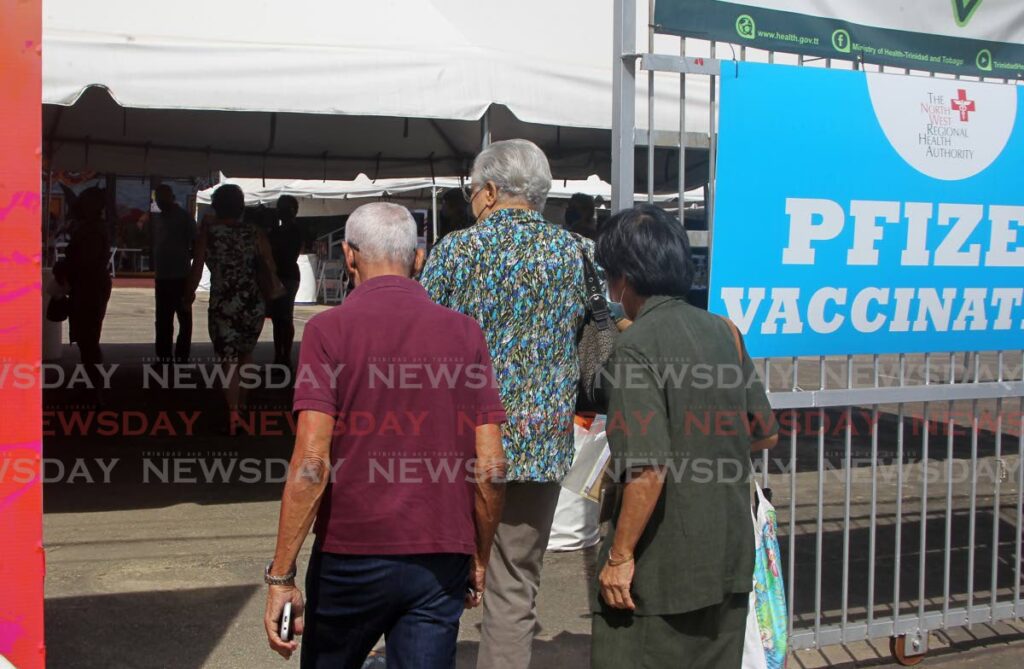RHAs 'juggle' covid19 care as virus surges

Regional health authorities (RHAs) continue a "juggling act" to manage as best as they can amid a record number of cases and fatalities during TT’s third covid19 wave.
On Friday, TT recorded its highest number of daily covid19 cases at 984 with the previous highest being 781 on November 17. Also TT surpassed it record number of deaths in 24 hours on November 20 at 28 and again five day later with 31.
Also, between Friday and Saturday there were 21 deaths, making it 78 fatalities since the beginning of December, and 2,236 since the start of the pandemic.
According to the Ministry of Health’s Saturday afternoon update, they were five elderly men, ten elderly women, four middle-aged men, and two middle-aged women. Fourteen people had multiple comorbidities, three had one comorbidity, and four had no known medical conditions.
In addition, 774 new cases were recorded from samples taken from December 1 to 3. The new cases increased the total number of positive cases since March 2020 to 74,533.
Meanwhile, 94 people were discharged from public health facilities while 271 recovered from home isolation, bringing the total number of people recovered to 60,202, and the number of active cases to 12,095, an increase of 388.
There were 529 people in hospital with 22 in the intensive care unit and 24 in the high dependency unit at Couva Hospital. There were also 10,619 in home isolation, 173 in step down facilities, and 99 in state quarantine facilities.
It added that, based on data from July to November, 6,408 of 7,134 people or 89.8 per cent of patients in the parallel health care system were unvaccinated.
At the ministry’s virtual press conference on Saturday morning, Chief Medical Officer Dr Roshan Parasram said throughout the pandemic the ministry has been trying to manage two systems with the same staff. He described it as a “juggling act” trying to balance staff and services between the two and admitted that some elective services may be affected depending on the load of the parallel health care system.
“The staff tends to go between both services. So we have tried our best to maintain the existing elective surgeries as best as we can together with clinic appointments. And we have used some of the telemedicine services in some of the RHAs extensively to avoid people having situations where people don’t have medication for example, and that they could have a consult on the phone without actually coming into the system.”
Health Minister Terrence Deyalsingh said a number of initiatives have been implemented at various RHAs to help staff deal with stress depending on the need.
Some RHAs hired more staff, including patient care assistants, to ease the burden of the enrolled nursing assistants and the registered nurses, they provide counselling, meals at covid19 institutions, sensitisation sessions in mass casualty management, and transportation for nurses on request. Some also rotate staff in and out of high-intensity areas where possible, maintain Christmas shopping days, and allow for 12-hour shifts so staff can get more consecutive days off.
“However, that can not take away from the load. It’s good therapy but what they need is for the public to not get infected," he said. “We need the public to work with us by getting vaccinated, by doing the three Ws, so that we could ease the actually physical pressure on them by not having you admitted into the hospital.”
Parasram added that there were “hardly any infections” of covid19 among the health care workers in the parallel health care system because they continue to have a supply of personal protective equipment and infection prevention control training.
“A lot of the times when our staff get infected they get infected outside of the workplace – when you drop your guard at home with family and friends. And that’s what we see in our system as well. When you have a high viral load like we do now in the country, people tend to get infected anywhere.”


Comments
"RHAs 'juggle' covid19 care as virus surges"